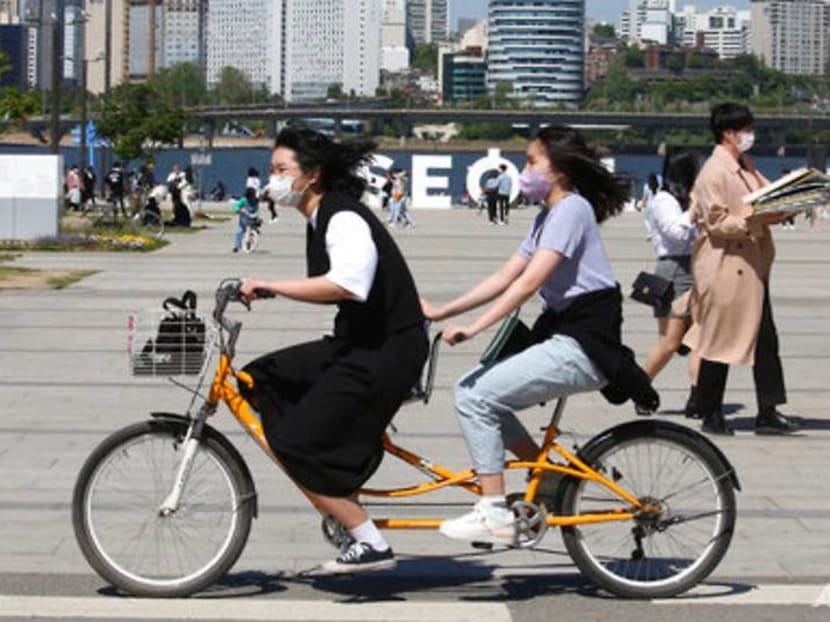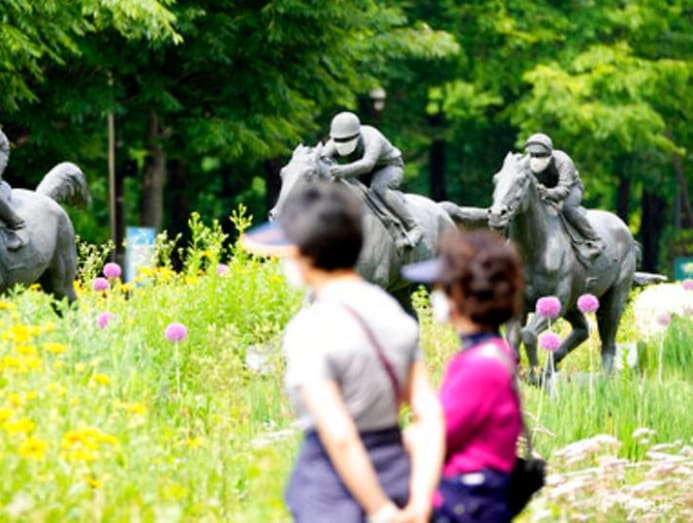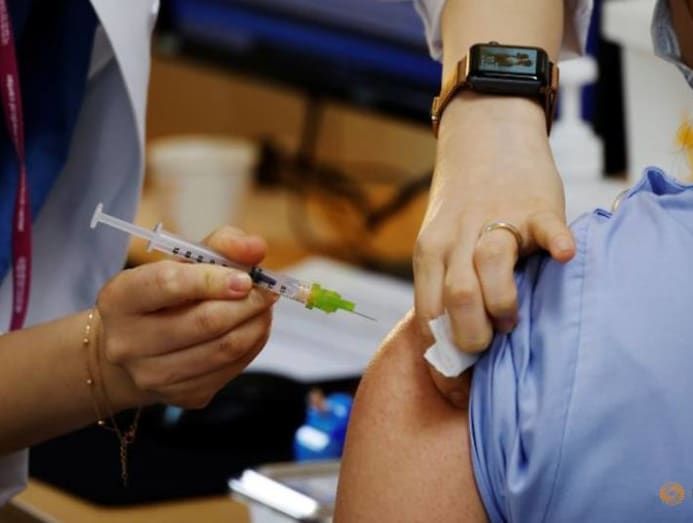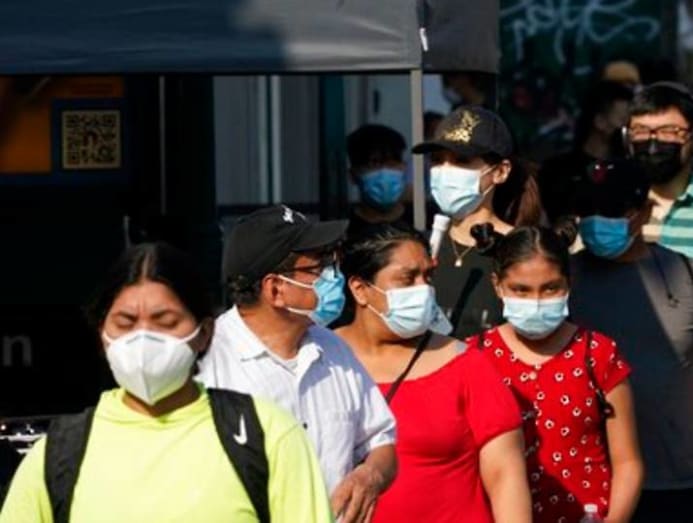commentary Commentary
Commentary: South Koreans wring hands over removing mask rules for the vaccinated
Amid growing calls for rules on mask-wearing in public areas to be relaxed among some quarters, South Korea has indicated those vaccinated can do so. But there’s good reason to think most will keep theirs on, says Steven Borowiec.

Women wearing face masks as a precaution against the coronavirus ride a bicycle at a public park along the Han River in Seoul, South Korea, May 9, 2021. (Photo: AP/Ahn Young-joon)
SEOUL: On mountains in South Korea, everyone knows the pandemic etiquette.
You can hike without your mask on, but if you see someone coming your way on the trail, you must put it back on, or make some other effort to cover your face as you pass them.
Many exchange nods or a hello and once several steps past the other hiker, people tend to remove their masks and proceed as before.
Hiking is South Korea’s national pastime and mountain trails are among the few public places where going around without a mask on is somewhat unofficially accepted.
READ: Commentary: Variants versus vaccines is becoming the new COVID-19 race
Throughout the pandemic, as the government has enacted a series of indoor and outdoor mask mandates of escalating strictness, mountain trails have been a respite from crowded urban spaces.
Since October 2020, after a huge surge in infections, masks were made mandatory in all public places, whether when taking public transportation, in medical care facilities or in outdoor spaces, including parks.
Even while exercising outdoors, in a gym, dance studio or at Taekwondo lessons, people had to put on a mask. Exceptions are made for athletes participating in games.
Anyone failing to mask up could face a fine of around US$90.

Now, as South Korea appears to be taking steps toward the end of the pandemic, mask etiquette is loosening on the trails before anywhere else. On hikes in recent weeks, I’ve come across groups of middle-aged people all with their masks pulled down over their chins or off entirely.
No one really makes a fuss, despite it being prohibited.
GROWING CALLS FOR LENIENCY ON MASK WEARING
There are a few reasons for this accepted leniency.
More than a year into the coronavirus pandemic, South Koreans have been sensitised to the prevailing infectious disease understanding that the virus spreads mostly in indoor, crowded and poorly ventilated spaces. Clusters in the country have been mostly confined to medical facilities, offices and religious events.
READ: Commentary: Wear your mask properly! Uncovering the reasons behind public mask shaming
To most South Koreans, an outdoor space seems unlikely to be a venue for transmission. As a physically strenuous activity, hiking also leads to rapid, heavy breathing, which can be uncomfortable with a mask on.
Yet these attitudes are also reflective of a growing optimism that the rule can be relaxed and hope that the COVID-19 saga is entering its final act. The number of new cases has been stable at several hundred per day for months, with people desensitised to fresh reported infections.
Despite initial hiccups in securing sufficient supplies because of a reliance on the multilateral COVAX initiative, the country is upbeat that vaccinations, which began in February, will gain pace.

As of early this week, only around 5.4 million people in a country of 52 million had received at least one vaccine shot. But the South Korean government recently signed deals with the US to acquire enough vaccine supplies to inoculate the whole country.
A partnership between Moderna and Samsung to ramp up production in the country is set to be inked.
READ: Commentary: Why is COVID-19 surging in the world’s most vaccinated country?
DANGLING INCENTIVES
Yet the tide is turning and the bigger stumbling block to getting shots in arms may be public indifference and complacency. Although daily new infection numbers are high, fatality rates have come down to the single digits.
To keep building that momentum and encourage more people to get vaccinated, the government has now dangled the carrot of tentative returns to normalcy.
In July, fully vaccinated people will be permitted to go maskless in outdoor spaces and hold family gatherings with as many as eight people, up from the current four, officials announced in end-May.
The government’s plan is to press full steam ahead with vaccines over the summer toward the goal of achieving herd immunity by November, and with any luck, heading into 2022 with COVID-19 in the country’s rearview mirror.
READ: Commentary: Why are some countries giving people freebies to get vaccinated?
CONCERNS OVER FOREGOING MASKS
Even after the goal of herd immunity is reached, there will remain the mostly psychological question of when it is time to forego masks entirely.
While in the early stages of the pandemic there were legitimate questions about how effective, if at all, masks were in limiting the spread of coronavirus, there is a firm consensus in the country that while not totally effective, masks are an inexpensive, easily distributed tool that can limit the spread of airborne ailments.
Few serious observers now doubt the wisdom of mandates like those in South Korea that require everyone in closed spaces like offices and public transit to don masks that cover their mouths and noses.
Indeed, in South Korea and other East Asian countries, face masks are not associated with any political identity and do not carry the culture-war baggage they have acquired in the West.

Masks were not an uncommon sight in indoor spaces even before the pandemic. South Korean companies do not customarily offer paid sick leave to workers who feel under the weather; before COVID-19 came along. Anyone with the sniffles was expected to suck it up and come to the office, though COVID-19 has created public pressure for firms to review their sick leave policy.
Workers feeling like they might have a cold or flu would wear a face mask both to protect themselves from exposure to harmful bacteria and reduce the risk of passing their germs to someone else.
Given that South Koreans generally don’t consider masks a major inconvenience, most people here are sick of the impediment to socialising that masks present by making it almost impossible to read facial expressions.
South Korea leaders know this. When meeting with a group of kids on the Children’s Day holiday in May, President Moon Jae-in told the youngsters he hoped they would be able to play with friends without masks “as soon as possible.”
(Are COVID-19 vaccines still effective against new variants? And could these increase the risk of reinfection? Experts explain why COVID-19 could become a “chronic problem" on CNA's Heart of the Matter podcast.)
MASKS MAY STAY ON FOR MOST IN THE END
Nevertheless, while there is general public keenness to get back to normal, many South Koreans seem content to continue some degree of mandated mask wearing.
A recent survey by the Korea Society Opinion Institute found that 45 per cent of respondents felt that even vaccinated people should still be required to wear masks in outdoor spaces.
How soon that happens will depend on the country’s success in carrying out vaccinations and the efficacy of those shots, but also on the possible emergence of coronavirus variants.
The country has been vigilant in testing and tracking the small trickle of travellers who come in. But the more transmissible variants could pose a tricky dilemma of how much risks are accepted in return for personal freedoms.
READ: Commentary: Some pain even as Singapore rises to the challenge of tighter COVID-19 measures
As a country, South Korea has withstood war and economic crisis and those historical memories have prepared people here with the grit needed to push through the coronavirus pandemic. Those historical memories have also inculcated a sense of caution.
While hikers and everyone else is eager to get back to normal, people here will not celebrate too early.
On streets in almost all other public places, mask-wearing is still uniform.
Mr Moon recently said that quarantine measures will be adjusted in October, when the plan is to have around 70 per cent of the population vaccinated. Until then, and perhaps after, masks and a general sense of caution are here to stay.
Steven Borowiec is a journalist based in Seoul.





